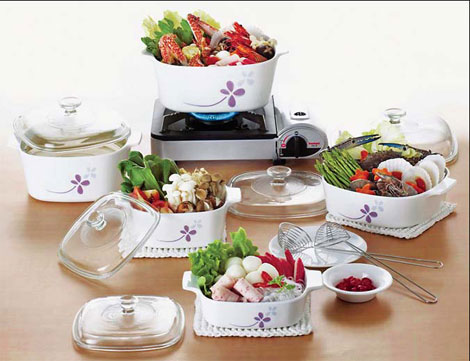|
|
 |
|
30th Anniversary Celebrations
Economic Development
New Rural Reform Efforts
Political System Reform
Changing Lifestyle
In Foreigners' Eyes
Commentary
Enterprise Stories
Newsmakers
Photo Gallery
Video and Audio
Wang Wenlan Gallery
Slideshow
Key Meetings
Key Reform Theories
Development Blueprint
Hong Liang:
Government role decisive for recovery Brendan J. Worrell:
Polish PM wraps up China tour OP Rana:
Saving the Earth more important Li Xing:
Teachers like Li need our support Cooking up profits
By LIU JIE (China Daily)
Updated: 2008-10-13 07:57  Though the characteristics of various marketplaces are different, Joseph T. Mallof stresses that he tries to focus on the similarities. As the CEO of World Kitchen LLC, a world leader in the homeware industry, Mallof says he believes that people all over the world want the same basic things. "They want success for their families, they want success for their careers, they want their health and they want tasty food," he says, adding that all people also like to be treated fairly. Concentrate on the common desires and one can do well cross culturally, he says. It's simple advice from one who knows. The 56-year-old American has previously worked for a series of transnational companies, such as Procter & Gamble, Johnson & Johnson and Novartis AG, in the United States, Canada, Mexico, the Philippines and Japan. Mallof was appointed to his current position in May 2006, almost at the same time as World Kitchen started its on-the-ground operation in China, with its own team in selling and importing products. Mallof says cookware sellers normally target younger women, women who are on their own for the first time, or starting a married household. In China it has become a trend for men to cook for families. "But who really buys the wares? Mainly women - wives, mothers," says Mallof. A survey released by a leading domestic market researcher CTR in September revealed that young Chinese females with college degrees, high incomes, refined tastes and who are avid shoppers are the major consuming group and key market fashion drivers in China. The survey covered 4,000 women in eight Chinese cities, aged 25-35, with high education levels and monthly salaries exceeding 5,000 yuan. It shows there are around 1.67 million such females in Chinese key cities and the group is growing. Meanwhile, they are brand-sensitive and are usually the consumption decision-makers for both themselves and their families, the survey says.
Over the last couple of years, Mallof's strategy of targeting young women in China has proved successful. The annual growth rate of Kitchen World's mainland sales revenue was 400 percent in 2007 and expected to reach 200 percent this year. "We are investing in China in the sense that any money we make we put back to our business - to hire more people, to set up more presence," says Mallof. He says that the tremendous progress is partly because the company grew from a small business here. "In the future we have a goal that we won't expect a similar kind of extraordinary growth, because the basis becomes bigger and bigger," he says. The US business has outlets in Shanghai, Beijing and their neighboring cities as well as Chongqing and Kunming in southwest China and Wuhan and Zhengzhou in central China. Second-tier cities are the arget for the coming years. World Kitchen is a subsidiary of US-based company Corning and manufactures and markets kitchen glass homeware products worldwide, for preparing, cooking, serving and storing food. World Kitchen is currently devoted to introducing four product brands to China. Pyrex was the world's first glass ovenware developed by the company in 1913. Corningware is an oven-to-table service made of Pyroceram or glass ceramic, a white ceramic-like material capable of withstanding enormous variations in temperature. Visions, developed in 1983, is the transparent version of Corningware, which is priced between around 400 yuan and 1,000-plus yuan on the Chinese market. The firm's most successful brand on the Chinese market is Corelle dinnerware, a break-resistant dinnerware fabricated from two different glass compositions laminated into three layers. It's selling points are that it's easy to clean, dishwasher and oven safe, lightweight, durable, break, chip, spot and fade-resistant under normal use, as well as attractively designed. Mallof says he believes their products are lucrative because, besides being established brands, the World Kitchen products are made of safe, high quality materials. The fact that Chinese social and business culture is centered around the meal table doesn't hurt either. But challenges still exist, the CEO acknowledges. Chinese consumers are very value-conscious. "When they appreciate our products such as Corelle, they also want to make sure the price is right. They treat the price and quality equally. They want high quality and a fair price," Mallof points out. He contrasts Chinese consumers with those in Japan. In Japan, innovation is very important and the consumers favor new US trends or others that are unique. "Prices are also very high there, as we usually introduce the latest cookware to the Japanese market and frequently update it with new innovations," says Mallof. "In some other markets, lower prices are favored over innovation. Here in China, consumers seek a fine balance." (China Daily 10/13/2008 page7)  
 |